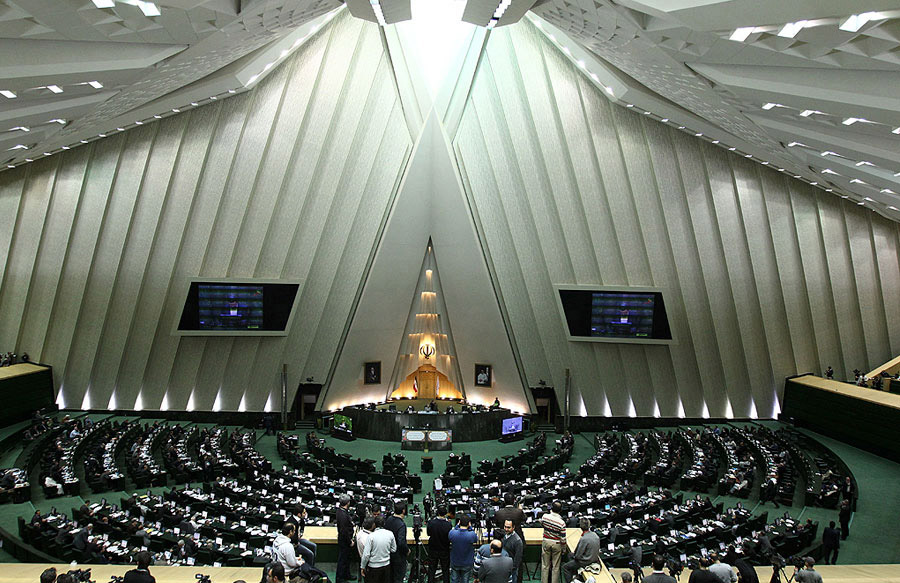Iranians largely 'indifferent' to elections for parliament and the Assembly of Experts
Tomorrow the country will pick 290 lawmakers as well as the 88 experts who will choose Khamenei's successor. Some 61 million people are eligible to vote, but turnout could be less than 40 per cent. From prison Nobel Peace Prize winner Narges Mohammadi calls for a boycott.
Tehran (AsiaNews) – Tomorrow more than 61 million Iranians will be called to the polls to pick 290 members of parliament (Majlis), the 12th legislature since the Islamic Revolution of 1979, and the 88 members of the Assembly of Experts, the body in charge of electing the Supreme Leader in the event of death or resignation by the incumbent, the elderly Ali Khamenei.
This is the first vote since mass protest broke out in the second half of 2022, following the death of Mahsa Amini, victim of the controversial compulsory headgear for women.
The death in custody of the morality police of the 22-year-old Kurdish woman sparked months of unrest and gave rise to a pro-rights movement called "Woman, Life, Freedom" brutally cracked down by Iranian authorities, who executed several young demonstrators.
According to experts, like in the previous election in 2020, the prevailing attitude among many voters is indifference, with most people more concerned about economic problems than politics.
One reason is that most reformist candidates have been excluded from the election, including former President Hassan Rouhani who was not allowed to run for re-election in the 88-seat Assembly of Experts.
Discontent is also widespread over the country’s economic situation, linked to stiff international sanctions imposed by former US President Donald Trump, which have sunk the country's economy, starting with the oil trade, impoverishing much of the population.
In 2019, police crushed popular unrest, creating a rift between the regime and ordinary Iranians that has been grown over the years.
According to the latest surveys, many voters are likely to vote with their feet, and stay away from polling stations with the turnout expected to be less than 30 to 40 per cent of eligible voters in spite of claims by the authorities that participation will be around 60 per cent.
For many Iranians not voting has become the only way to criticise the exclusion of most pro-reform or moderate candidates in an election process dominated by conservatives and radicals. Staying away is the only way to delegitimise the Islamic Republic.
Such a prospect has led Supreme Leader Khamenei to urge Iranians to show "the world that the people are present in important and decisive situations", which is the only way to “save the country.”
"Not voting does not lead to anything and does not solve problems,” said Khamenei, during a meeting with young people.
Similarly, for Pasdaran commander General Hossein Salami, voting would be a "slap in the face of [Iran’s] adversaries."
Radio Farda, the Farsi service of Radio Free Europe/Radio Liberty, received scores of audio and written messages from Iran, in which people say that they will not go to the polls for what they consider "meaningless" elections, useful only to help hardliners "consolidate" power.
Jailed Nobel Peace Prize winner Narges Mohammadi is also among those calling for a boycott; for her, “boycotting the elections of the dictatorial religious regime is not just a political imperative but also a moral duty for those seeking freedom and justice in Iran."
About 25,000 people applied to run for office in tomorrow's vote, but the Guardian Council rejected about 10,000. Even the slightest criticism of the government is grounds enough for exclusion in a country with no independent electoral commission or monitoring body.
The procedure is overseen by the Ministry of Interior and the Guardian Council, which includes six clerical leaders appointed by the Supreme Leader and six jurists approved by parliament from a list provided by the head of the judiciary, also a Khamenei appointee.
According to the law, Iranians aged 30 to 75 can run for parliament if they show "commitment" and loyalty to Islam, jurisprudence, and the constitution, hold a master's degree or equivalent with at least five years of experience in public or government institutions.
The majlis is the unicameral legislative body, and its bills become law only after they are vetted by the Guardian Council and approved if they conform with the constitution and Islamic law.
Voters will also renew the Assembly of Experts, which will likely choose Khamenei's successor from a list of candidates loyal to the system and hardline power holders.
This explains the disqualification of former Majlis Speaker Ali Larijani and former president and outgoing Assembly of Experts member Hassan Rouhani.
Thus, tomorrow's vote matters only insofar as it represents the start of the succession process.
Khamenei was picked in 1989 after the death of Ayatollah Ruhollah Khomeini, the founder of the Islamic Republic. His son, Mojtaba is one of the regime’s leading figures, albeit from behind the scenes.
Unlike Khomeini, the current supreme leader centralised power and exerts considerable influence in every aspect of the country's life (political or otherwise), starting with President Ebrahim Raisi, who largely answers to Khamenei himself.
Tomorrow's vote is the first stage in finding the latter’s successor.
24/05/2021 17:46
02/03/2016 20:03
19/06/2021 13:23







.png)










